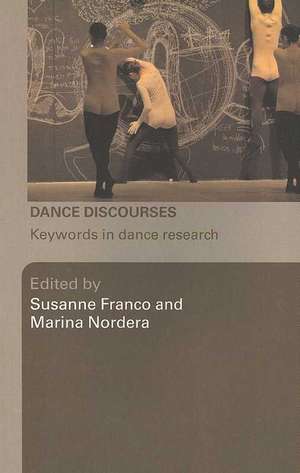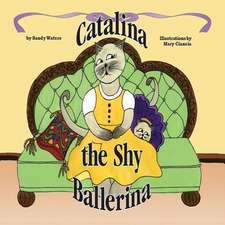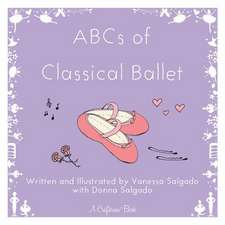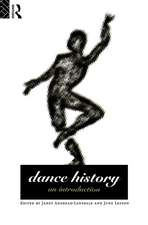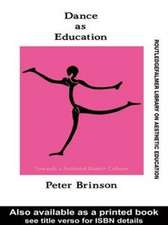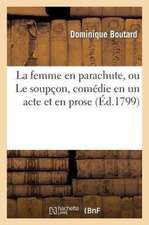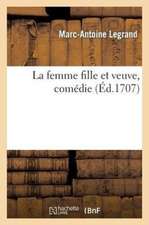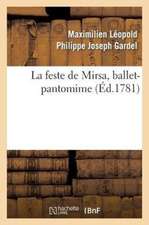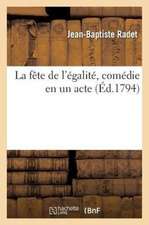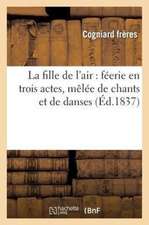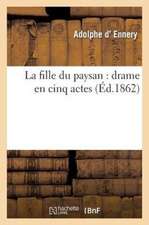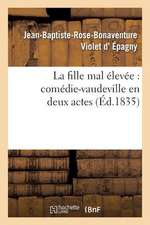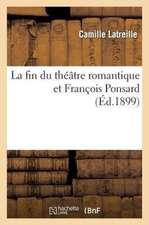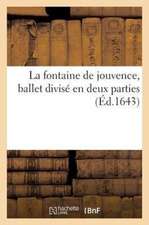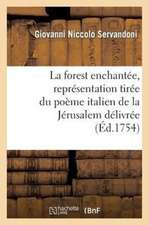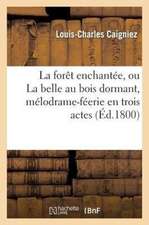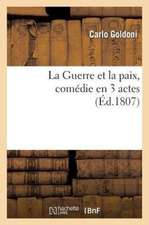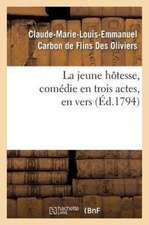Dance Discourses: Keywords in Dance Research
Editat de Susanne Franco, Marina Norderaen Limba Engleză Paperback – 28 noi 2007
With an introduction exploring the history of dance studies and the development of central themes and areas of concerns in the field, the book is then divided into three parts:
- politics explores 'Ausdruckstanz' – an expressive dance tradition first formulated in the 1920s by dancer Mary Wigman and carried forward in the work of Pina Bausch and others
- gender examines eighteenth century theatrical dance – a time when elaborate sets, costumes, and plots examined racial and sexual stereotypes
- identity is concerned with modern dance.
| Toate formatele și edițiile | Preț | Express |
|---|---|---|
| Paperback (1) | 385.54 lei 6-8 săpt. | |
| Taylor & Francis – 28 noi 2007 | 385.54 lei 6-8 săpt. | |
| Hardback (1) | 1109.21 lei 6-8 săpt. | |
| Taylor & Francis – 28 noi 2007 | 1109.21 lei 6-8 săpt. |
Preț: 385.54 lei
Nou
Puncte Express: 578
Preț estimativ în valută:
73.78€ • 77.58$ • 60.96£
73.78€ • 77.58$ • 60.96£
Carte tipărită la comandă
Livrare economică 16-30 aprilie
Preluare comenzi: 021 569.72.76
Specificații
ISBN-13: 9780415423090
ISBN-10: 0415423090
Pagini: 296
Ilustrații: 18 b/w images and 4 tables
Dimensiuni: 138 x 216 x 16 mm
Greutate: 0.35 kg
Ediția:New.
Editura: Taylor & Francis
Colecția Routledge
Locul publicării:Oxford, United Kingdom
ISBN-10: 0415423090
Pagini: 296
Ilustrații: 18 b/w images and 4 tables
Dimensiuni: 138 x 216 x 16 mm
Greutate: 0.35 kg
Ediția:New.
Editura: Taylor & Francis
Colecția Routledge
Locul publicării:Oxford, United Kingdom
Notă biografică
Susanne Franco teaches dance history at the University IUAV of Venice and has taught at the Universities of Paris III and Nice. She is the author of Martha Graham (2003), and the editor of Ausdruckstanz. Il corpo, la danza e la critica (2006) and of the series Dance For Word/Dance Forward, and of its first volume Frédéric Flamand (2004).
Marina Nordera is professor and chair of Dance Department at Nice University (France). She has taught and performed early dance. Former president of the Italian Association for the Dance Research, she published essays on dance in early modern period. She is currently working on a book on dance and gender in Early Modern Italy.
Marina Nordera is professor and chair of Dance Department at Nice University (France). She has taught and performed early dance. Former president of the Italian Association for the Dance Research, she published essays on dance in early modern period. She is currently working on a book on dance and gender in Early Modern Italy.
Cuprins
Contents List of illustrations Notes on contributors Acknowledgements Introduction Susanne Franco and Marina Nordera Part 1: keyword: POLITICS topic: AUSDRUCKSTANZ 1.1 Dance and the political: States of exception Mark Franko 1.2 Fritz Böhme (1881-1952). Archeology of an ideologue Laure Guilbert 1.3 Ausdruckstanz across the Atlantic Susan Manning 1.4 Ausdruckstanz on the left and the work of Jean Weidt Yvonne Hardt 1.5 Ausdruckstanz: traditions, translations, transmissions Susanne Fanco Part 2: keyword: FEMININE. MASCULINE topic: THEATRICAL DANCE IN THE EIGHTEENTH CENTURY 2.1 Feminine. Masculine Linda Tomko 2.2 Dido’s otherness: Choreographing race and gender in the ballet d’action Susan Leigh Foster 2.3 Danseuses and danseurs at the Opéra de Paris (1700-25) according to the cast lists in the libretto--programs Nathalie Lecomte 2.4 A balance lost: Staging the body and controlling social mobility during the French Revolution Inge Baxmann 2.5 Gender underway. Notes for histories yet to be written Marina Nordera Part 3: keyword: IDENTITIES topic: CONTEMPORARY DANCE 3.1 Dance, identity and identification in the postcolonial world Andrée Grau 3.2 Resistant identities: Anderson and Ruckert Ramsay Burt 3.3 Donald Byrd: Re/making beauty Thomas deFrantz 3.4 Dispositif trouble: When what is said is not what is shown Hélène Marquié 3.5 Identity, the contemporary, and the dancers Isabelle Ginot Name index
Descriere
Exploring contemporary analytical approaches to understanding performance traditions, Dance Discourses pedagogical structure makes it ideal for courses in performing arts and humanities.
